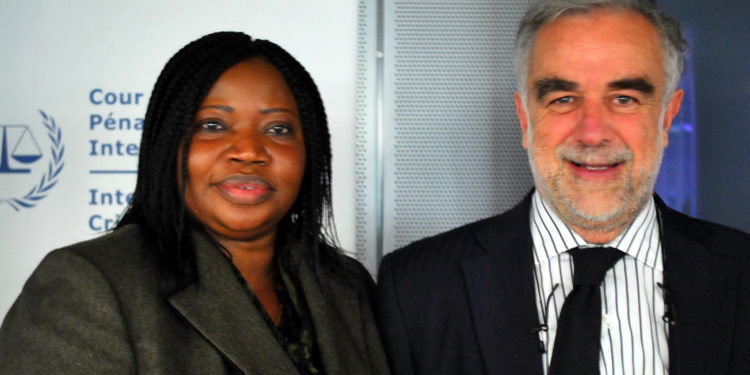An ICC Pre-Trial Chamber has rejected a request to open an investigation into possible war crimes committed by the United States in Afghanistan.
An official investigation of war crimes and crimes against humanity in Afghanistan was meant to be a test case of whether the International Criminal Court would dare to target powerful countries like the United States besides trying arrested rebel leaders and (deposed) presidents from Africa.
On Friday, judges of an ICC Pre-Trial Chamber rejected the Prosecutor’s request in the “interests of justice”. After the request to open investigations had been pending since 2017, the three judges concluded that there are scarce chances of obtaining the necessary (state) cooperation to gather evidence. And as the member states organized in the Assembly of States Parties (ASP) have been refusing over the past years to grant the court’s requests for the necessary resources to do its work, there would probably be a lack of financial resources to do the Afghanistan job, unless necessary resources are withdrawn from other investigations.
The decision by the chamber, presided by Judge Antoine Kesia-Mbe Mindua from the Democratic Republic of Congo, displays a spirit of pragmatism and realism. The decision also purports to have taken into account the interest of the long-term credibility of the ICC. An investigation could also have targeted crimes allegedly committed by American citizens, both in Afghanistan and in black sites in Eastern Europe, apart from Taliban rebels and Afghan government forces.
Some professional observers of the ICC somewhat cynically wonder though if the court has just given in to bullying by the United States. US Secretary of State Mike Pompeo last year threatened sanctions if the ICC targeted US citizens or US allies (Israel). Chief Prosecutor Fatou Bensouda’s visa for private travel to the US has already been revoked.
The judges said they had given careful consideration to the victims’ feelings and possible frustration in case an investigation they might have authorized would fail: “In summary, the Chamber believes that, notwithstanding the fact that all the relevant requirements are met as regards both jurisdiction and admissibility, the current circumstances of the situation in Afghanistan are such as to make the prospects for a successful investigation and prosecution extremely limited.
“Accordingly, it is unlikely that pursuing an investigation would result in meeting the objectives listed by the victims favouring the investigation, or otherwise positively contributing to it. It is worth recalling that only victims of specific cases brought before the Court could ever have the opportunity of playing a meaningful role as participants in the relevant proceedings; in the absence of any such cases, this meaningful role will never materialise — in spite of the investigation having been authorized. Victims’ expectations would not go beyond mere aspirations.”
This, far from honouring the victims’ wishes and aspiration that justice be done, would result in creating frustration and possibly hostility towards the Court and therefore negatively impact its very ability to pursue credibly the objectives it was created to serve, the judges added.
Witness participation in the pre-trial procedure has been overwhelming. Whereas in ICC cases about Africa one regularly saw thousands of victims seeking to participate, in the case of Afghanistan, it has been millions. The judges note: “A high number of victims of the situation have come forward to present their views on whether the Chamber should authorise the commencement of the Prosecutor’s investigation into the situation. Overall, the Court has received a total of 794 representations in Dari and Pashto, as well as Arabic, English and German of which 699 were transmitted to the Pre-Trial Chamber on behalf of the following victims: 668 representations on behalf of 6,220 individuals; 17 representations on behalf of 1,690 families; 13 representations on behalf of several millions of victims, including 26 villages; and one representation on behalf of an institution.”
The victims’ longing for justice was also an important driving force behind the UN’s ad hoc International Criminal Tribunal for the Former Yugoslavia. The ICTY did not give up easily, but saw its perseverance rewarded by success in the end: so for example, Ratko Mladić, the former Bosnian Serb military leader held responsible for the Srebrenica massacre of Muslim victims, the only genocide in Europe after the Second World War, was arrested in Serbia and transferred to The Hague more than 15 years after the first indictment against him was brought by chief prosecutor Richard Goldstone of South Africa. His successors Louise Arbour, Carla Del Ponte and Serge Brammertz kept the issue alive through numerous press conferences, interviews and diplomatic lobbying. When the ICTY closed its doors, it could proudly say: There are no fugitives left.
The ICC judges failed to even try on Afghanistan. Possible targets of the OTP investigation might have been the US and their allies’ staff, Afghan government forces and Taliban rebels, for numerous allegations of killing civilians, torture and sexual violence.
NGOs like Human Rights Watch are heavily disappointed by the decision. “The decision by the International Criminal Court’s judges to reject an investigation in Afghanistan is a devastating blow for victims who have suffered grave crimes without redress,” said HRW. “The judges’ logic effectively allows states to opt out on their obligation to cooperate with the court’s investigation. This sends a dangerous message to perpetrators that they can put themselves beyond the reach of the law just by being uncooperative.”
Amnesty International added: “’The ICC’s decision today is a shocking abandonment of victims which will weaken the court’s already questionable credibility.’’
And the Fédération Internationale des Ligues des Droits de l’Homme commented: “The decision not to open an investigation is insane and politically charged. A call for non-cooperation. An affirmation of double standards. This situation was exactly what the Court was created for.”







